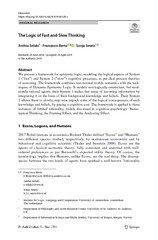The Logic of Fast and Slow Thinking
Peer reviewed, Journal article
Published version

Åpne
Permanent lenke
http://hdl.handle.net/1956/22167Utgivelsesdato
2019-06-01Metadata
Vis full innførselSamlinger
Originalversjon
https://doi.org/10.1007/s10670-019-00128-zSammendrag
We present a framework for epistemic logic, modeling the logical aspects of System 1 (“fast”) and System 2 (“slow”) cognitive processes, as per dual process theories of reasoning. The framework combines non-normal worlds semantics with the techniques of Dynamic Epistemic Logic. It models non-logically-omniscient, but moderately rational agents: their System 1 makes fast sense of incoming information by integrating it on the basis of their background knowledge and beliefs. Their System 2 allows them to slowly, step-wise unpack some of the logical consequences of such knowledge and beliefs, by paying a cognitive cost . The framework is applied to three instances of limited rationality, widely discussed in cognitive psychology: Stereotypical Thinking, the Framing Effect, and the Anchoring Effect.
